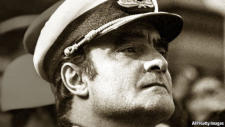The Economist
https://www.economist.com/obituary/2010/11/25/emilio-massera?story_id=17571977&fsrc=rss
Emilio Massera
Emilio Eduardo Massera, commander of Argentina’s
“dirty war”, died on November 8th, aged 85
Nov 25th 2010
 Obituary
Obituary
Nov 27th 2010 edition |
HAD he not opted for the
navy, a course his father suggested for him, Emilio Massera might
have become a professor of philology. Words fascinated him, with
their “faithlessness” and slipperiness, with the way
they could clarify like a shaft of daylight and then spread
confusion like a mist. “Words perturb our powers of
reason,” he wrote once. Therefore, “the only safe
words are our own.” He made sure of it, rolling them
majestically off his tongue when, as a member of the three-man
junta that terrorised Argentina after March 1976, he invoked
“the idolaters of totalitarianism”, the
“monstrous intimacy with blood” in which the country
had sunk itself, and the “metaphysical principles”
through which the government would soon display “the
grandeur of its power”.
Certain words he wished to grab hold of and nail, with his own
definitions, to the mast: “duty”,
“rationality”, “obedience”,
“patriotism”, “sacrifice”. The meanings
of others he altered for good. By 1978 the word capucha,
“hood”, meant murky basements across the land in
which ordinary Argentines were kept for years blindfolded,
chained and shackled. A paquete was now a bound human being,
delivered up to torture. A submarino was no longer just a
submarine, or a children's treat of chocolate squares melting in
hot milk, but a way of holding a suspect's head under water
fouled with faeces and urine until they thought they were
drowning. And desaparecer, to disappear, became a transitive
verb, meaning to kidnap innocent citizens, drug them and load
them on to military aircraft from which they would be tossed,
living, into the sea. Perhaps 10,000 Argentines died this way in
the seven years the junta was in power.
These things occurred, said Admiral Massera, because there was a
war on: ostensibly against the mindlessly violent Montoneros
guerrillas, but also against everything he felt they represented,
atheism, leftism, nihilism and the destruction of Western
Christian civilisation. The battlefield was boundless, because it
was the human spirit; the stakes were as high as possible,
because the very soul of Argentina was emperilled. Only the armed
forces, “the ultimate moral reserve”, could save the
country. That was why, in company with the nervy, tweedy Jorge
Videla, head of the army, and Orlando Agosti, head of the air
force, he had decided after “serene meditation” to
seize the government of Argentina from the hapless Isabelita
Perón. It was an act of service for the common good, a
strike “against those who favour death by those of us who
favour life”.
Admiral Massera's war, the only one he ever fought, soon acquired
the adjective sucia, “dirty”, in Argentina. Its
tactics were random terror, disorganisation, abductions, murder,
rape and the routine use (in the admiral's phrase) of “the
utmost violence”. Officially, this was “the Process
of National Reorganisation”. His own part of it he
conducted from the Navy Mechanics' School (ESMA) north of Buenos
Aires, where paquetes were kicked from cars outside and the
screams of desaparecidos could be heard downstairs. Mechanics'
training at ESMA was now in the use of the picana, or electric
cattle-prod, in rooms called “operating theatres” or
“the Room of Happiness”. Bodies were burned at
“barbecues” on the sports field. The admiral himself
took part at first to encourage his men—for all were still
part of the official naval hierarchy, carrying off their victims
in unmarked navy cars.
Cleansing the country
He loved this power, and always looked as though he did: big,
bluff, loud, handsome, like an admiral out of opera, with a
well-known weakness for young actresses whom he would entertain,
under navy protection, at his flat in the Calle Darragueyra. He
enjoyed his official yacht, even when Fernando Branca, a
millionaire whose wife was one of his lovers, curiously vanished
from it without trace while they were out sailing together.
Power was sweeter, too, for being unearned. Meetings with the
elderly Juan Perón, at first in the (later outlawed) P-2
Masonic lodge, had ensured his promotion to head of the navy in
1974 over 14 senior men. In government, both before and after the
coup, he threw his weight about, demanding a long list of Lupo
frigates, Exocet missiles and destroyers with which to scare the
British over the Malvínas. His Masonic contacts included
global arms-dealers and drug-traffickers, as well as the Vatican
bank: all allies in his moral crusade.
In 1983 he said he would set up a “social democratic”
party. The words meant nothing, and he did not get far, as the
junta was imploding. As his colleagues stepped down that year,
pursued by judges, they declared victory in the admiral's war
against subversion. The deaths involved had caused them
“Christian pain”, they said. But “life”
had triumphed in the end.
This seemed the ultimate twisting of words, but the admiral had
one more up his braided sleeve. As he left court in 1985,
sentenced to the maximum penalty of life imprisonment for his
murders, torture and detentions (a sentence he did not serve,
since Carlos Menem, a Peronist president, pardoned him in 1990),
he snapped that he was “responsible, but not guilty”.
Guilty implied evil. But he was proud of his reorganising work.
He had cleansed the country, and “clean” was a good
word.
Further Reading:
Freemasonry in Argentina |
Masonería en Argentina





